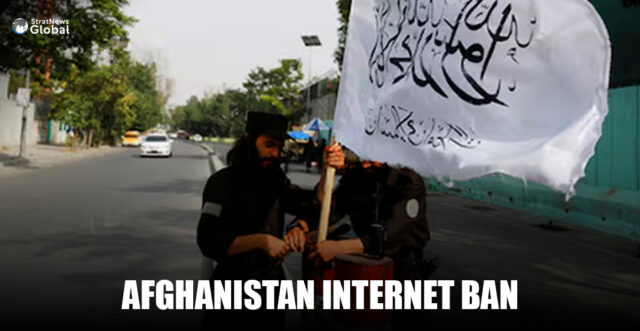In Afghanistan, women who rely on fibre-optic internet to sell their intricate embroidery now face a ban in five northern provinces, cut off by Taliban authorities citing the prevention of “immoral activities.”
Residents in other provinces, including Kandahar, Herat and Parwan, have reported disruptions, though these have not been formally acknowledged by authorities.
The loss of access to the fibre-optic network has stranded thousands of homes, businesses and schools and left them reliant on costly, patchy mobile phone connections.
The measure is the first large-scale internet shutdown since the Islamist group seized power in 2021, though it is not nationwide.
For Sabrinna Hayat, who runs Hayat Handicrafts with nine women breadwinners stitching firaq partug, the long embroidered dresses commonly worn by Afghan women, along with other handmade items, the outage has tripled internet costs.
She said her group used to receive orders from Afghanistan and abroad, but now must repeatedly activate mobile internet packages that cost three times as much as fibre, just to keep up with customers.
“A complete ban has been imposed on fibre-optic cable … This action has been taken to prevent immoral activities, and an alternative solution will be developed within the country to meet necessary needs,” Haji Zaid, a spokesman for the governor of the Balkh province, said last week.
The Kunduz provincial media office issued a similar statement. The Ministry of Communications in Kabul did not immediately respond to a request for comment.
Across town, a tailor who asked to be identified only by her family name, Dawrani, said her workshop employing widows and women in need has been gutted, given that sales and orders depend on connectivity.
“If I cannot even earn this small piece of bread, I will be forced to leave this country,” she said.
Cut Off From The World
The internet has been a lifeline for students, especially girls barred from secondary schools and universities, but the shutdown has cut off even that option in northern Afghanistan.
Dawrani said her daughters were no longer able to take their online English classes.
Digital rights advocates say the Taliban’s reasoning is less about morality than about control.
Obaidullah Baheer, a Kabul-based academic, said the ban echoed earlier Taliban moves that used immorality as justification for restrictions, including on women’s education, and were followed by promises of reform that never materialised.
“It shows a very anti-modern version of the Taliban. Seems like their fight is against modernity and they’re fitting the bill of people who used to call them draconian.”
For some women, the debate is distant.
“Through this tailoring work, I managed to put food on the table. Without the internet, even that may disappear,” said Dawrani.
(With inputs from Reuters)





